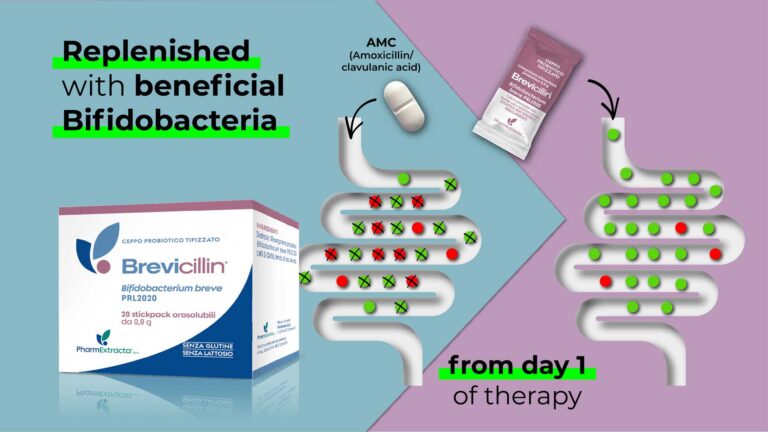
Brevicillin®: birth of a new probiotic tool to serve as add-on treatment to Amoxicillin/Clavulanic acid
Do you know that taking Amoxicillin/Clavulanic acid disrupts the gut microbiota and, particularly, causes a dramatic drop in Bifidobacteria?
This prompted us to search for a bifidobacterial strain that is able to resist to AMC and that could be developed in a probiotic supplement to be taken in conjunction with this antibiotic therapy.
Here comes the birth story Brevicillin®: the only probiotic containing the special strain Bifidobacterium breve PRL2020 with intrinsic resistance to AMC.
Antibiotics: the flip side of the coin
Antibiotics are a wonderful tool, sometimes the only one able to eradicate certain bacterial infections. On the other hand, when taking antibiotics, there are also some disadvantages to be considered.
In the first place, antibiotics can disrupt the gut microbiota so much so that the impact of antibiotics on the intestinal ecosystem has often been compared to that of an atomic bomb capable of devastating the surrounding environment without discrimination. This metaphor is particularly fitting when speaking of broad-spectrum antibiotics which have the ability to eliminate both Gram-positive and Gram-negative bacteria, thus getting rid of both possible pathogens and good bacteria that populate our intestines and play a fundamental role in maintaining eubiosis, the condition of ideal balance.
Amoxicillin is certainly one of the most prescribed broad-spectrum antibiotics, especially for children and adolescents. When Amoxicillin alone is unable to resolve a bacterial infection, it is necessary to administer Amoxicillin/Clavulanic acid (AMC), the addition of which further amplifies the spectrum of action of the antibiotic, exerting a bactericidal activity even on some more evolved bacteria that have developed mechanisms of resistance against Amoxicillin.
Amoxicillin/Clavulanic acid and the dramatic drop in Bifidobacteria
Among the good bacteria that are most sensitive to the activity of Amoxicillin, Bifidobacteria stand out. Microorganism of this genus are the first colonizers of the infant intestine in which they have an almost exclusive presence, with a role in influencing some immunomodulatory activities in the host at very early stages of life and in shaping the physiology of the intestinal ecosystem through their metabolic activities.
The sensitivity to amoxicillin of bifidobacterial species has been demonstrated by numerous in vitro evaluations. However, very little in vivo data are available and therefore only limited knowledge is available regarding the effects of amoxicillin alone or in combination with clavulanic acid on bifidobacterial communities residing in the human gut.
It is starting from these assumptions that recently a group of researchers attributable mostly to the Laboratory of Probiogenomics of the University of Parma conducted an interesting study to explore the impact of AMC on the intestinal microbiota of 23 children and compare it with that of 19 healthy children who had not been treated with antibiotics in the previous 6 months (control group).
The results indicated a dramatic reduction of bacteria in children treated with Amoxicillin/Clavulanic acid compared to the control group, resulting in the total content of Bifidobacteria being halved.
What’s more, the antibiotic bombardment creates some “empty space” in the intestinal microbiota and what unfortunately often happens is that the space previously occupied by the eliminated Bifidobacteria is later occupied by potentially harmful bacteria that grow dramatically. For this reason, it is important to safeguard the balance of the microbiota in order to maintain a state of equilibrium replenishing the gut with beneficial bacteria through the intake of quality probiotics.
Brevicillin® is the ideal choice for repopulating Bifidobacteria when taking Amoxicillin or Amoxicillin/Clavulanic acid
The use of the most common probiotics DURING antibiotic therapy is not a good option to buffer the decline in good bacteria, since the products on the market often do not have characteristics that allow them to resist the activity of the antibiotics used, as they also are overwhelmed by the bactericidal action of these drugs.
This scenario has stimulated the search for a bifidobacterial strain that is able to resist to AMC in order to investigate the possibility of its use as a probiotic to be taken in conjunction with this antibiotic therapy to repopulate the microbiota early.
The research culminated in the isolation of a very special strain: Bifidobacterium breve PRL2020 which showed the highest resistance value to Amoxicillin and AMC. But don’t worry, it is an intrinsic resistance that cannot be transferred to other bacteria.
PRL2020 also showed to grow in the presence of AMC. These features made this strain an interesting candidate for the development of a new probiotic product to be used when a therapy with Amoxicillin or Amoxicillin/Clavulanic acid is prescribed and prevent the dramatic decline in Bifidobacteria that this usually involves: Brevicillin® was born.
